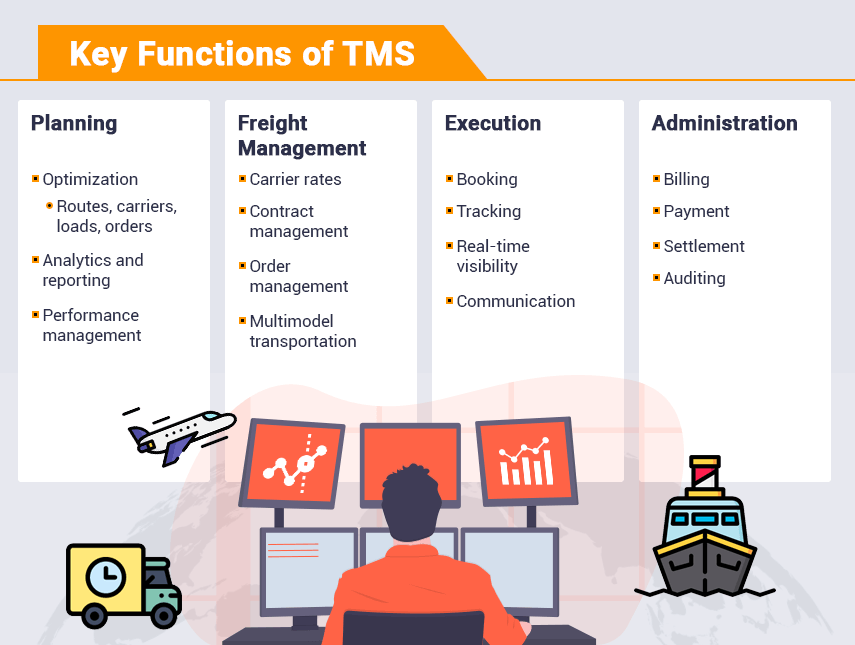In the rapidly evolving landscape of logistics and supply chain management, technological advancements have played a pivotal role in reshaping how businesses operate. One such game-changer is Transportation Management System (TMS) software, which has revolutionized the way companies handle their transportation operations.
TMS software offers a comprehensive solution that optimizes transportation processes, enhances visibility, and boosts efficiency across the supply chain. In this article, we will delve into the world of TMS software, exploring its features, benefits, and its transformative impact on modern logistics.
Understanding TMS Software
A Transportation Management System (TMS) is a sophisticated software solution designed to streamline and manage the end-to-end transportation processes of a company. It encompasses a range of functions, including order management, route planning, carrier selection, load optimization, freight tracking, and performance analytics. TMS software acts as a central hub that brings together various stakeholders, such as shippers, carriers, and suppliers, facilitating seamless communication and collaboration.
Also Read – Best Trucking Companies for New Drivers in Canada
Key Features of TMS Software
Automated Route Optimization
TMS software employs advanced algorithms to determine the most efficient routes for transportation. This feature not only reduces fuel consumption and transportation costs but also minimizes delivery times, resulting in improved customer satisfaction.
Load Consolidation
Efficient load planning is crucial to maximizing truck capacity and minimizing empty space during transportation. TMS software identifies opportunities for consolidating loads, reducing the number of trips required and subsequently lowering operational costs.
Real-Time Tracking
With the integration of GPS and IoT technology, TMS software enables real-time tracking of shipments. This heightened visibility allows stakeholders to monitor the progress of deliveries, anticipate delays, and proactively address any issues that may arise.
Carrier Selection
TMS software often includes a database of carriers, their rates, and performance histories. This information empowers companies to make informed decisions when selecting carriers, ensuring reliable and cost-effective transportation partners.
Data Analytics
Modern TMS solutions are equipped with robust analytics tools that provide insights into transportation patterns, costs, and performance metrics. This data-driven approach enables companies to identify areas for improvement, optimize processes, and make strategic decisions.
Integration Capabilities
TMS software seamlessly integrates with other supply chain management systems, such as Enterprise Resource Planning (ERP) and Warehouse Management Systems (WMS), creating a unified ecosystem that enhances overall operational efficiency.
Benefits of TMS Software
Cost Savings
TMS software’s ability to optimize routes, consolidate loads, and select cost-effective carriers leads to substantial cost savings in transportation operations. Reduced fuel consumption, lower labor expenses, and minimized delays all contribute to a healthier bottom line.
Enhanced Efficiency
Automation of manual tasks and the elimination of paperwork streamline processes and reduce the likelihood of errors. This efficiency translates into faster order processing, quicker deliveries, and improved customer satisfaction.
Visibility and Transparency
Real-time tracking and data analytics offer heightened visibility into the entire transportation process. Shippers, customers, and other stakeholders can access accurate information about shipment status, leading to improved communication and better decision-making.
Risk Mitigation
TMS software’s predictive capabilities enable companies to identify potential risks, such as weather disruptions or traffic delays, and plan accordingly. This proactive approach minimizes the impact of unforeseen events on delivery timelines.
Scalability
As businesses grow, this software can easily scale to accommodate increasing transportation volumes. This scalability ensures that operations remain efficient even as demand rises.
Sustainability
By optimizing routes and load consolidation, TMS software contributes to reduced carbon emissions and a greener transportation footprint, aligning with the growing emphasis on sustainable business practices.
Transforming Modern Logistics
The integration of TMS software into the logistics industry has brought about transformative changes that resonate throughout the entire supply chain. One notable transformation is the shift from reactive to proactive operations. Traditional logistics models often involve reacting to delays or disruptions after they occur. However, TMS software’s predictive capabilities allow companies to anticipate challenges and take preventive measures, minimizing disruptions and maintaining reliable service.
Moreover, TMS software has significantly improved the collaboration between various stakeholders. In the past, communication gaps between shippers, carriers, and customers could lead to misunderstandings and inefficiencies. With a TMS in place, all parties have access to real-time data, enabling them to align their efforts seamlessly and make informed decisions together.
The benefits of TMS software extend beyond operational improvements; they also play a crucial role in enhancing customer satisfaction. With accurate tracking information, customers receive timely updates on their shipments, leading to improved transparency and trust. Meeting delivery expectations consistently contributes to positive customer experiences and lasting relationships.
In conclusion, Transportation Management System stands as a beacon of technological innovation within the logistics and supply chain landscape. Its ability to optimize routes, consolidate loads, enhance visibility, and drive efficiency has propelled companies into a new era of transportation operations. As businesses continue to recognize the value of software, its transformative impact will only become more pronounced, reshaping the logistics industry for years to come.





